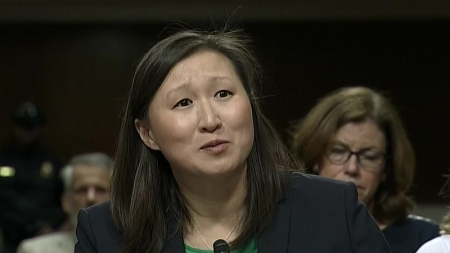Welcome to MeriTalk News Briefs, where we bring you all the day’s action that didn’t quite make the headlines. No need to shout about ‘em, but we do feel that they merit talk. […]
The Department of Defense is getting on board with some critical website and email protections that have been mandated across civilian Federal government agencies, even if it is lagging somewhat behind other departments in applying encryption and anti-phishing measures. […]
Panelists at MeriTalk’s Cyber Security Brainstorm on Thursday will shed light on a host of vital cybersecurity issues, including threats to control systems, the foundational importance of security to IT modernization efforts, and the keys to success in risk-based security practices, according to a sneak peek into the thinking of just a few of the 25 experts scheduled to speak. […]
Booz Allen Hamilton has won an $885 million task order to provide artificial intelligence (AI) and machine learning support to the U.S. Government Program Office, for use by the Defense Department (DoD), the company announced Monday. […]
Welcome to MeriTalk News Briefs, where we bring you all the day’s action that didn’t quite make the headlines. No need to shout about ‘em, but we do feel that they merit talk. […]
Welcome to MeriTalk News Briefs, where we bring you all the day’s action that didn’t quite make the headlines. No need to shout about ‘em, but we do feel that they merit talk. […]
The Defense Department (DoD) today issued its finalized request for proposals (RFP) for the Joint Enterprise Defense Infrastructure Cloud contract, formally opening the bidding process for a potential $10 billion enterprise cloud infrastructure. […]
As it looks to get new technologies developed and into the field as quickly as possible, the Department of Defense has been making greater use of Other Transaction Authority (OTA), a quick-strike contracting mechanism that has gone in and out of fashion since the 1950s, but is now seeing a resurgence. […]
The Defense Information Systems Agency’s (DISA) plan to move a key cybersecurity service to the cloud is in keeping with the push toward cloud computing for many of the Department of Defense’s operations, including those involving classified information. The question at the moment is whether the cloud services DISA wants to tap into are secure enough to handle the job. […]
The Department of Defense (DoD) on Tuesday released a justification and approval (J&A) document that says DoD is expanding the scope of the contract for its Electronic Health Record (EHR) system known as MHS Genesis. The document says that the contract must be expanded to achieve “a single standard baseline solution” with the new Department of Veterans Affairs EHR and also to incorporate the U.S. Coast Guard into the DoD EHR. […]
Congress, in its conference report for the National Defense Authorization Act for FY 2019 released earlier this week, is demanding more transparency from the Pentagon regarding the agency’s Joint Enterprise Defense Infrastructure (JEDI) cloud contract. […]
The Department of Defense is taking a more concerted approach to the development and use of artificial intelligence (AI) by bringing AI projects under one roof and emphasizing the importance of working with industry and academia. At the same time, DoD is also recognizing that it needs to give ethics a seat at the table. […]
After the National Defense Authorization Act (NDAA) for FY 2019 cleared a major hurdle late yesterday with the release of a conference report that reconciles differences between House and Senate versions of the bills, techies across the Federal government are finding that IT modernization and innovation amendments for the Pentagon fared well in the legislation. […]
The National Defense Authorization Act (NDAA) for FY 2019 took a big step toward passage with the release of the conference report late yesterday that unifies House and Senate NDAA legislation and places in sharp focus concerns about growing cyber and electronic warfare threats and ways that the United States should address them. […]
A new Defense Department (DoD) Risk Management Framework (RMF) – due to be delivered to agency leaders in roughly seven weeks – will have strong implications for the way the department’s cybersecurity professionals perform their tasks, according to John Bergin, IT and Business System Reform Lead at DoD. […]
Department of Defense (DoD) Chief Information Officer Dana Deasy said today at the Defense Systems Summit that he has identified four “key strategic areas” that will work to support the National Defense Strategy (NDS). Those four areas – cloud, artificial intelligence, C3 (command, control, and communications), and cybersecurity – are organized not in order of importance, but rather “order of integration,” Deasy said, with each of the priorities flowing from the prior one. […]
Paul Craft, director of operations at the Joint Force Headquarters Department of Defense Information Network (JFHQ-DoDIN), spoke today at the Defense Systems Summit about how his relatively new component of U.S. Cyber Command is now tasked with operating and securing the entirety of DoD’s sprawling IT network infrastructure and has undertaken a complete restructuring of network operations for all of DoD. […]
Dana Deasy, chief information officer at the Department of Defense (DoD), said today at the Defense Systems Summit that he would not commit to an official release date for the finalized request for proposal (RFP) for DoD’s Joint Enterprise Defense Infrastructure (JEDI) cloud contract. […]
Keeping pace with growing cyber threats is an uphill battle for Federal agencies as network complexity increases and the boundaries of networks extend to systems and devices not always under the control of their IT organizations. […]
The White House isn’t doing enough to address in a public forum a range of artificial intelligence issues and needs to institute a public process to seek comments on AI-related issues, said a group of six industry groups and more than 80 individuals from academia and the private sector in a July 4 letter to the White House Office of Science and Technology Policy (OSTP). […]
To celebrate Independence Day, the Department of Defense (DoD) released its Digital Engineering Strategy on Wednesday. The strategy “promotes the use of digital representations of systems and components and the use of digital artifacts to design and sustain national defense systems,” DoD said. […]
The potential of artificial intelligence opens up the abundant future of game-changing machine-based applications in science, medicine, national defense, business, and just about every other area. But getting there while maintaining the U.S. lead in AI research and development will hinge on two old-school constants of innovation: money and people. […]
Amid growing fears of large-scale cyberattacks–ranging from attacks on infrastructure, to cyber espionage that threatens national security, to a “terabyte of death”–Congressional lawmakers are calling for a more clearly defined strategy for responding to such attacks. […]
The National Defense Authorization Act (NDAA) for FY2019 will head into conference next week when legislators return from the Fourth of July recess. The $700+ billion must-pass defense spending bill has been approved in both the House and Senate, and now the two chambers must come together to reconcile differences in the legislation and re-vote the unified bill before it can land on President Trump’s desk for signing. […]
With cybersecurity threats on the rise, most recently seen in a Chinese hack of a Navy contractor, the Department of Defense is taking new steps to ensure security, in part by putting more of the onus on contractors. […]
Deputy Defense Secretary Patrick Shanahan last Wednesday issued a memorandum that officially establishes the Defense Department’s (DoD) new Joint Artificial Intelligence Center (JAIC), confirming statements made by Secretary James Mattis and other DoD officials in April that a center to house DoD’s roughly 600 AI projects was forthcoming. […]
The latest edition of the Army’s annual Cyber X-Games exercise is designed to let Reserve and other cyber warriors team up to train in dealing with real-world situations. It is focused on protecting U.S. infrastructure, an area somewhat outside the norm for the exercises, but one that reflects an emerging potential battleground on the cyber landscape. […]
The Department of Defense (DoD) is using big data analytics and automated intelligence to both uncover discrepancies in budget-draining programs and engage leadership to direct funding to the correct priorities, according to a former Deputy Secretary of Defense and the founder of a business intelligence firm that supports the Pentagon. […]
While political and military leaders debate the pros and cons of whether the United States needs a separate “Space Force,” Chinese hackers have offered a reminder of two truths: operations in space are extremely important, and the assets used in space are vulnerable to cyberattack. […]
Welcome to MeriTalk News Briefs, where we bring you all the day’s action that didn’t quite make the headlines. No need to shout about ‘em, but we do feel that they merit talk. […]
















